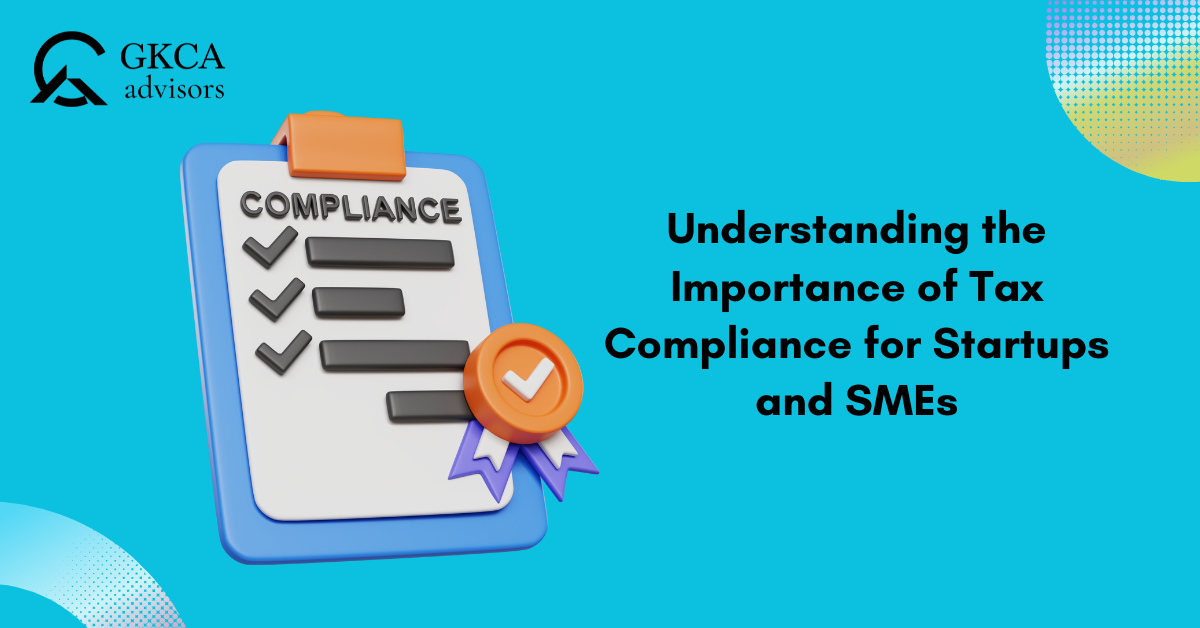Tax compliance represents a fundamental cornerstone of business operations that many Startups and SMEs find challenging to navigate. This comprehensive guide delves deep into the intricacies of tax compliance, offering detailed insights and actionable strategies to ensure your business maintains proper tax adherence while maximizing growth opportunities.

Why Tax Compliance is Critical for Business Success
Tax compliance serves as more than just a regulatory requirement—it’s a crucial foundation for sustainable business growth. Here’s why it matters:
Building Credibility with Stakeholders
- Establishes trust with potential investors by demonstrating financial responsibility
- Strengthens relationships with financial institutions for better lending terms
- Creates a positive reputation with regulatory authorities through consistent tax compliance and timely tax filings.
- Enhances credibility with business partners and customers
Risk Mitigation and Legal Protection
- Prevents costly penalties and fines that could impact cash flow
- Reduces the risk of legal complications and regulatory scrutiny
- Protects business assets from tax-related liabilities
- Ensures smooth business continuity without regulatory interruptions
Business Growth and Opportunities
- Opens doors to government contracts requiring tax compliance certification
- Enables access to tax incentives and benefits designed for compliant businesses
- Facilitates easier business expansion and market entry for Startups and SMEs
- Supports long-term strategic planning with clear financial records
Common Tax Compliance Issues Faced by Startups
1. Income Tax Compliance Challenges
- Regular Filing Requirements
- Understanding complex filing schedules and deadlines
- Managing quarterly vs. annual filing obligations
- Coordinating multiple tax jurisdiction requirements
- Ensuring accuracy in tax calculations and declarations
- Documentation Management for tax returns and compliance.
- Creating comprehensive systems for revenue tracking
- Implementing expense categorization protocols
- Maintaining supporting documents for all financial transactions
- Establishing clear audit trails for financial decisions
- TDS (Tax Deducted at Source) Management to prevent non-compliance.
- Understanding applicable TDS rates for different payment types
- Implementing systems for timely TDS deposits
- Managing TDS certificates and reconciliations
- Ensuring compliance with TDS filing requirements to avoid penalties related to non-compliance.
2. GST Compliance Requirements
- Return Filing Process
- Understanding various GST return types and their purposes
- Managing monthly, quarterly, and annual filing schedules
- Reconciling input and output GST for Startups and SMEs
- Handling GST adjustments and corrections
- Credit Management
- Tracking input tax credits accurately
- Maintaining proper documentation for credit claims
- Understanding credit utilization rules
- Managing credit reversals when required
- Invoice and Documentation
- Implementing proper invoice numbering systems to facilitate accurate income tax return submissions.
- Including all mandatory GST invoice elements
- Managing B2B and B2C invoice requirements
- Maintaining digital copies of all GST documents
3. Operational Compliance Challenges
- Resource Management
- Allocating adequate staff for the importance of tax compliance in startups and small businesses.
- Budgeting for compliance-related expenses
- Investing in necessary technology and tools
- Managing time constraints while ensuring accuracy
- Knowledge Management
- Staying updated with changing tax laws
- Understanding industry-specific tax requirements
- Training staff on compliance procedures
- Accessing reliable tax information sources
Essential Tax Compliance Strategies for SMEs
Comprehensive Documentation Management
- Systematic Record Organization
- Implement digital filing systems with clear naming conventions
- Create backup protocols for all financial documents
- Establish document retention schedules
- Develop systematic retrieval procedures
- Digital Infrastructure
- Invest in secure cloud storage solutions
- Implement document scanning and digitization protocols for small business tax filing.
- Create automated backup systems
- Establish access controls and security measures to protect sensitive taxation information.
Strategic Tax Planning
- Regular Assessment Protocols
- Conduct monthly tax position reviews
- Implement quarterly tax planning sessions
- Perform annual tax strategy evaluations
- Schedule regular meetings with tax advisors
- Payment Planning
- Create tax payment calendars
- Establish tax provision accounts
- Monitor cash flow for tax obligations
- Implement early warning systems for tax due dates to aid startups and small businesses.
Professional Support Integration
- Expert Engagement
- Select qualified tax consultants with industry experience
- Establish regular consultation schedules
- Develop clear communication channels
- Create escalation protocols for complex issues
- Technology Implementation to streamline tax filing processes for small businesses.
- Choose appropriate tax compliance software
- Train staff on software usage
- Regular system updates and maintenance to support efficient tax return processing.
- Integration with existing accounting systems
Building a Tax-Compliant Culture
Leadership Initiatives
- Strategic Priority Setting
- Establish clear compliance objectives
- Create accountability frameworks to enhance the importance of tax compliance.
- Develop compliance performance metrics
- Regular review of compliance goals
- Resource Allocation
- Budget for compliance activities
- Assign dedicated compliance personnel
- Invest in training and development
- Provide necessary tools and technologies
Comprehensive Training Programs
- Regular Training Sessions
- Conduct monthly compliance updates focusing on the importance of tax compliance.
- Organize quarterly training workshops
- Provide access to online learning resources
- Develop internal knowledge sharing systems
- Documentation and Procedures
- Create detailed compliance manuals
- Develop step-by-step guides
- Establish clear reporting procedures
- Regular updates to procedure documents
Cost-Benefit Analysis of Tax Compliance
Investment in Compliance
- Direct Costs
- Professional service fees
- Software and technology expenses
- Training and development costs
- Documentation and filing expenses
- Indirect Benefits
- Reduced risk of penalties associated with tax evasion and non-compliance.
- Better business reputation
- Improved stakeholder relationships
- Enhanced business opportunities
Conclusion
Tax compliance represents a crucial investment in your business’s future rather than merely a regulatory burden. While the initial setup and maintenance of proper tax compliance systems require significant resources, the long-term benefits far outweigh these investments. By implementing robust compliance frameworks, leveraging professional expertise, and fostering a compliance-focused culture, your business can navigate the complex tax landscape while maintaining focus on core growth objectives.
Remember that tax compliance is an evolving process that requires regular attention and updates. Stay proactive in reviewing and adjusting your compliance strategies to ensure your business remains ahead of regulatory requirements while maintaining operational efficiency, especially in taxation for Startups and SMEs.
